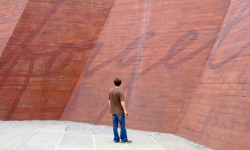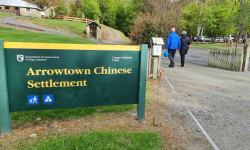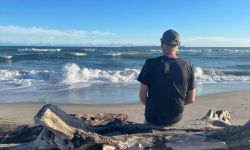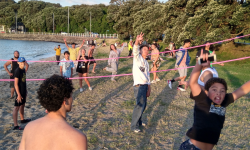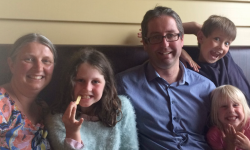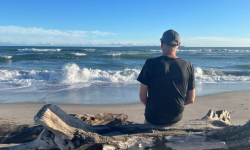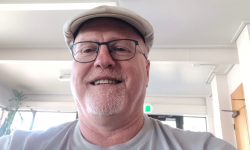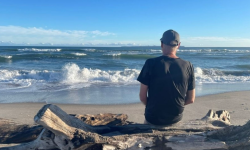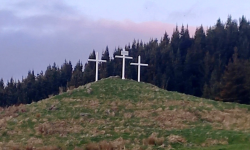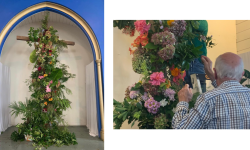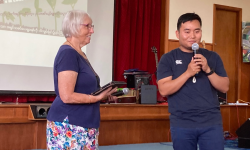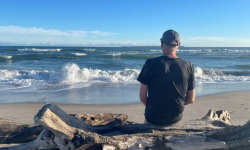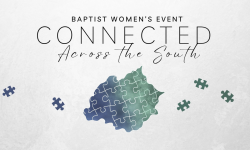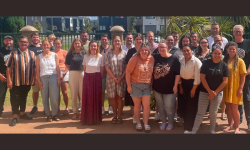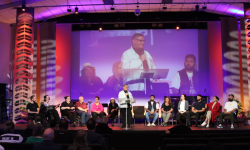Who is Jesus?
Image used with permission from The Chosen TV Series.
Christians have two ways of understanding who Jesus is. Two ways that start at very different places, but ultimately end up saying the same thing.
The first way starts with God- the God who made this universe and everything in it.
Imagine what an introduction from this God might look like; imagine this God wanted to show us what they are like. There could be messages sent to us (and Christians think this God has done that). Perhaps there might be intentional clues and hints put into the fabric of this world (and we think God has done that too).
But by far the best way for God to be fully introduced to us would be for God to genuinely become a human. Because then, if we met this God-human, we wouldn’t just be learning about God, we would actually be meeting God!
The first way Christians understand who Jesus is, is that he is God become human – Jesus is God introducing us to God’s self in a way that we can really know the God who made this universe and everything in it.
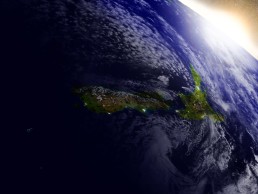
God became human
God became Human
Video used with permission from The Chosen TV Series. (S01E08)

The second way Christians understand who Jesus is starts with a human – a normal, everyday human – someone who puts his trousers on one leg at a time just like the rest of us.
This human lived at a particular time and at a particular place – being an individual human meant he had a particular culture, a particular gender, a particular body, a particular group of friends and acquaintances, and a particular name – Jesus.
But these friends and acquaintances noticed that Jesus said and did things that humans don’t do. He healed people; he controlled the wind and rain with a word; he spent time with outcasts and people that polite society rejected. And when he died, he came back alive again. Normal people don’t do that! Those around him eventually worked out that the reason for all this is that God’s Spirit was guiding and empowering him.
Jesus wasn’t just an extraordinary human, he was a human-God.
So working from the top down, Jesus is a God-human. Working from the bottom up, Jesus is a human-God.

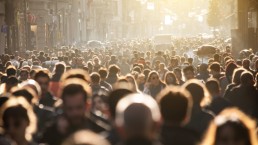
Any way you look at it, the utterly unique thing about Jesus is that he is the meeting point between creator and creation. Jesus is not just God’s introduction to us; God is standing with us on humanity’s side, leading us back to God’s self. Everything Jesus is, said, or did is all about bringing God and humanity together.
Our Baptist faith communities exist to participate in Jesus' ongoing work of bringing God and humanity together – we refer to this as gospel renewal to people and places.
Click here to find a local church. Or if you would like to read more about Jesus, a good place to start would be an account of his life that a medical doctor wrote who lived at the same time as Jesus, the doctor’s name was Luke. The book is based on extensive research, and you can read it online here. (Luke, NLT).
Latest articles
Anzac Day reflection 2024
Remember, lest we repeat our mistakes, writes Sam Schuurman in this Anzac Day reflection.
5-star biblical preaching
For the fifth of people in our Baptist churches listening to podcasts, here’s a new one containing biblical preaching, and it has a 5-star rating!
Outdoor worship services
Ilam Baptist Church brings their worship services out into God’s creation – An interview about the inspiration, the experiences, and the learnings.
Lessons from the 1880 Arrowtown Chinese settlement mission
How can the stories of the Arrowtown Chinese gold miners challenge and inspire multicultural ministry in our church today?
Charles Mail: Healthy faith communities
Journeys to baptism that began at eCamp 23 | Over 100 attend free English class bringing gospel renewal in Christchurch | Influencing change for people…
Unexpected adventure
Jen's pivot into ministry with doctors and medical students and an upcoming opportunity for Christian health workers and students to connect and be inspired.
Church opens sauna
Ōrākei Baptist Church’s tropical summer.
Upper South’s new Children & Family Ministry Coach
Get to know Steph Wood, the new Children & Family Ministry Coach for the Upper South Baptist Association.
Charles Mail: Proclaiming Jesus
Thank you Easter Camp volunteers! | Celebrating culture with the Karen community | My day at Easter Camp | Baptist attendance statistics | The Baptist…
Getting to know…Rod Robson
Rod is the Chair of the Baptist Assembly Council and Sole Pastor of Opawa Baptist Church, Christchurch.
Charles Mail: Living
Charles invites four Baptist leaders to reflect on the death, burial, and resurrection of Jesus Christ – our Lord and our Saviour.
Easter Sunday reflections
Two brief reflections on this day…
Good Friday reflections
Two brief reflections on this day…
From the President: Madness in March
Having decided to visit as many churches and leaders as possible, our Baptist President has had a packed month. She reflects on her time with…
Your faith community needs YOU
Do you like to write? Can you capture a story? For nearly 150 years Baptist churches in New Zealand have been sharing articles, stories, news…
The Baptist NZ photo competition
Sponsored by Christian Savings. First prize: $1000...
Charles Mail: Our invitations
A prayer for Easter camps | Motueka baptisms | Karen Baptist Churches' culture night | Responding to the Ministry of Disabled People announcement | More…
Believing your worth with Sarah Beisly
Upcoming event for women in the South. Worship, teaching, inspiration, spotlights, comedy, food, and plenty of connection.
30 Around 30
Around 30 thirty-year-olds (or close enough) gathered to dream, discern and listen together about the Baptist movement...
The dreams of Baptist Māori: Hui 2023
The Iriiri Māori session of our 2023 Hui last November was called He Koronga Maatou – We have a dream.
